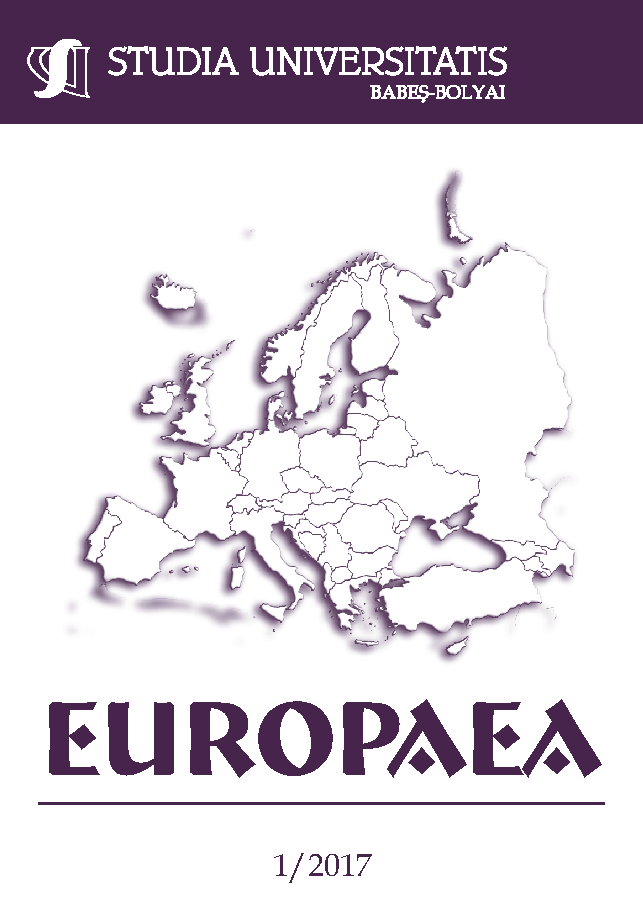THE EU “ENGAGEMENT WITHOUT RECOGNITION” POLICY IN ITS EASTERN NEIGHBORHOOD DE FACTO STATES. THE CASE OF ABKHAZIA AND SOUTH OSSETIA
DOI:
https://doi.org/10.24193/subbeuropaea.2017.1.07Keywords:
Engagement without recognition, de facto states, Abkhazia, South Ossetia, European Eastern PartnershipAbstract
This article aims to analyze the limits and the opportunities encountered in the implementation of the EU Non-Recognition and Engagement Policy with Abkhazia and South Ossetia (NREP), launched in December 2009. Part of the EaP toolkit to strengthen EU’s relations with its new Eastern Neighborhood, the NREP contributed to numerous legislative and discursive changes towards Abkhazia and South Ossetia in the Georgian politics. However, because the NREP was almost merged with the legislation and approach of Georgia towards its two breakaway republics, Sukhum/i and Tskhinvali mistrusted any engagement actions coming from Brussels and Tbilisi. Their reactions following the adoption of the visa waiver for Georgia are an indication of the depth casted between belligerents that the NREP could not fill in. Therefore, we advocate that a clearer and much more coherent EU agenda towards its Eastern de facto states is very much needed in order to decrease the level of humanitarian isolation that affects the people living in such areas and to increase the EU leverage on conflict transformation and resolution in the EaP framework.
References
Akçakoca, Amanda, Thomas Vauhauwaert, Richard Whitman, Stefan Wolff (2009) “After Georgia: conflict resolution in the EU’s Eastern Neighbourhood”, EPC Issue Paper No.57, [http://epc.eu/documents/uploads/961937412_EPC%20Issue%20Paper%2057%20-%20After%20Georgia.pdf], February 28, 2017.
Cooley Alexander and Lincoln A. Mitchell (2010), “Engagement without Recognition: A new Strategy toward Abkhazia and Eurasia’s Unrecognized States”, Center for Strategic and International Studies, The Washington Quarterly: 33:4, 59-73.
Cooley, Alexander (2010), “Georgia’s Territorial Integrity”, The American Interest, Vol.5/5, [http://www.the-american-interest.com/2010/05/01/georgias-territorial-integrity/], March 4, 2017.
Cornell, Svante E. (2005), Small Nations and Great Powers. A Study of Ethnopolitical Conflict in the Caucasus, London and New York: Routledge Curzon.
De Waal, Thomas (2017),“Engagement Without Recognition: The Limits Of Diplomatic Interaction With Contested States”, Carnegie Europe, [http://Carnegieeurope.Eu/2017/01/17/Enhancing-Eu-S-Engagement-With-Separatist-Territories-Pub-67694], February 25, 2017.
EU, Georgian Officials Take to Twitter to Celebrate European Parliament’s Visa Free Vote (2017), Civil.ge, [http://www.civil.ge/eng/article.php?id=29830], March 2, 2017.
Fischer, Sabine (2010), “The EU’s Non-Recognition and Engagement Policy towards Abkhazia and South-Ossetia”, ISS Seminar Report, Brussels, [http://www.iss.europa.eu/uploads/media/NREP_report.pdf], February 28, 2017.
Georgia and the EU(2017), European External Action Service Press Release, [https://eeas.europa.eu/headquarters/headquarters-homepage_en/1237/Georgia%20and%20the%20EU], March 2, 2017.
Grono, Magdalena (2016), “Isolation of Post-Soviet Conflict Regions Narrows the Road to Peace”, The International Crisis Group, [https://www.crisisgroup.org/europe-central-asia/caucasus/isolation-post-soviet-conflict-regions-narrows-road-peace], March 4, 2017.
Joint Declaration of the Prague Eastern Partnership Summit, [http://www.consilium.europa.eu/uedocs/cms_data/docs/pressdata/en/er/107589.pdf], February 27th, 2017.
Kereselidze, Nino (2015), “The Engagement policies of the European Union, Georgia and Russia towards Abkhazia” in Caucasus Survey, Vol.3/3, 309-322, [http://www.tandfonline.com/doi/abs/10.1080/23761199.2015.1102451?journalCode=rcau20], February 22, 2017.
Law on occupied territories (2009), [http://www.ilo.org/dyn/natlex/docs/SERIAL/81268/88220/F1630879580/GEO81268.pdf], March 2, 2017.
Sokhumi, Tskhinvali Reject Tbilisi’s EU Visa Liberalization Offer (2017), Civil.ge, [http://www.civil.ge/eng/article.php?id=29834], March 4, 2017.
State Strategy on Occupied Territories: Engagement through Cooperation (2010), [http://www.civil.ge/files/files/SMR-Strategy-en.pdf], March 2, 2017.
The Council’s Press release following the adoption of the regulation on the visa liberalization for Georgia (2017), [http://www.consilium.europa.eu/en/press/press-releases/ 2017/02/27-visa-liberalisation-georgia/], March 4, 2017.
The European Integration Index 2014 for Eastern Partnership Countries (2014), [http://www.eap-index.eu/sites/default/files/EaP%20Index%202014.pdf], February 12, 2017.
Zürcher, Christoph (2007), The Post-Soviet Wars. Rebellion, Ethnic Conflict, and Nationhood in the Caucasus, New York and London: New York University Press.
Downloads
Published
How to Cite
Issue
Section
License
Copyright (c) 2017 Studia Universitatis Babeș-Bolyai Europaea

This work is licensed under a Creative Commons Attribution-NonCommercial-NoDerivatives 4.0 International License.






